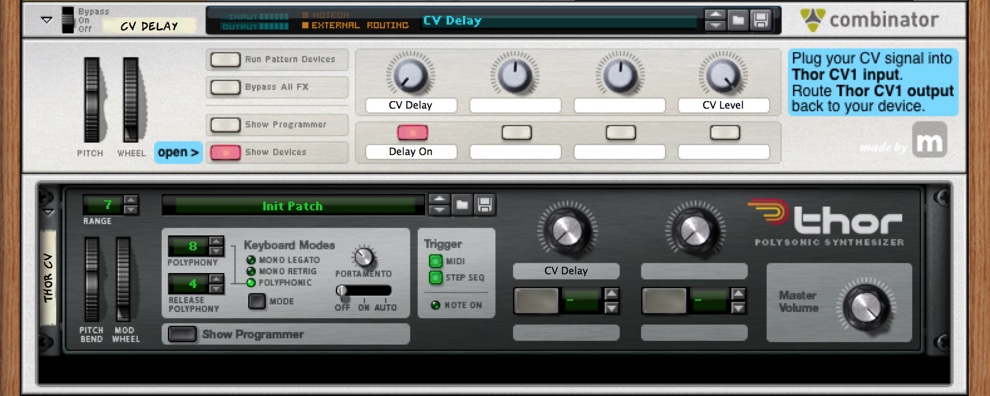Martin Francis asked a question on ReasonBanks: “What’s the easiest way to delay the cv signal?” All kinds of answers came up including suggestions for additional Rack Extensions. Then Martin added: “Question…is the CV delay doable with Thor?”
Well, yes you can! In Thor CV and audio are treated in the same way so you can route any CV signal to any audio input, filter, chorus or… delay!
Connecting CV using Thor

Connect the CV signal you want to delay to the Thor CV1 input. And take the Thor CV1 output and route it back to your device. This way Thor is connected as a CV insert for the CV signal.
Now connect the Audio IN 1 to Audio 1 MONO/LEFT. Activate the Delay of Thor and turn all the controls to their minimum value except for the Dry/Wet mix (put this one on fully Wet, 127)
A little programming…

See the above screenshot for the little programming configuration it takes. Only these steps are needed (see update):
- your CV signal is send to Filter 3 Left input (read: the CV signal is now a pure audio signal)
- because of the audio connection on the back, Filter 3 output is send to Audio IN 1
- Audio IN 1 is send to CV Output 1 (cool right? we’re changing CV into audio and back into CV again… feels like magic? 😀 )
- Rotary 1 controls the amount of Delay Time of the Filter 3 output
That’s it. Do save the patch as a Combinator patch. Unfortunately the Reason Combinator lacks a way to do easy CV mapping so you need to open the device for routing the CV signal to and from Thor. The Combinator does save the Audio IN 1 to Audio 1 MONO/LEFT routing on the back though, which is handy.
To make things super easy, I made a Combinator for it. You can download it here:
CV Delay (144.1 KiB, 2,184 hits)

Like it? Let me know!
UPDATE: Selig suggested a few small changes to make it even better. I have updated the file since I like these ideas. Check them at ReasonTalk. The above download-link includes the changes.

2 Comments
Awesome technique. I am still using a similar approach using Thor as an audio to cv router. While the idea remains the same, it kind of visually shows on the audio meters when the cv gets delayed (outputs on the delays themselves).
Yet this technique might be quite useful just because I don’t have to add the additional DDL to route it through!
Thanx Marco!
Thanks! I am not using this routine myself that often but it opens many new possibilities. One idea that came to mind: using a random LFO to slightly change the timing of the CV values for beats.
By Post Author